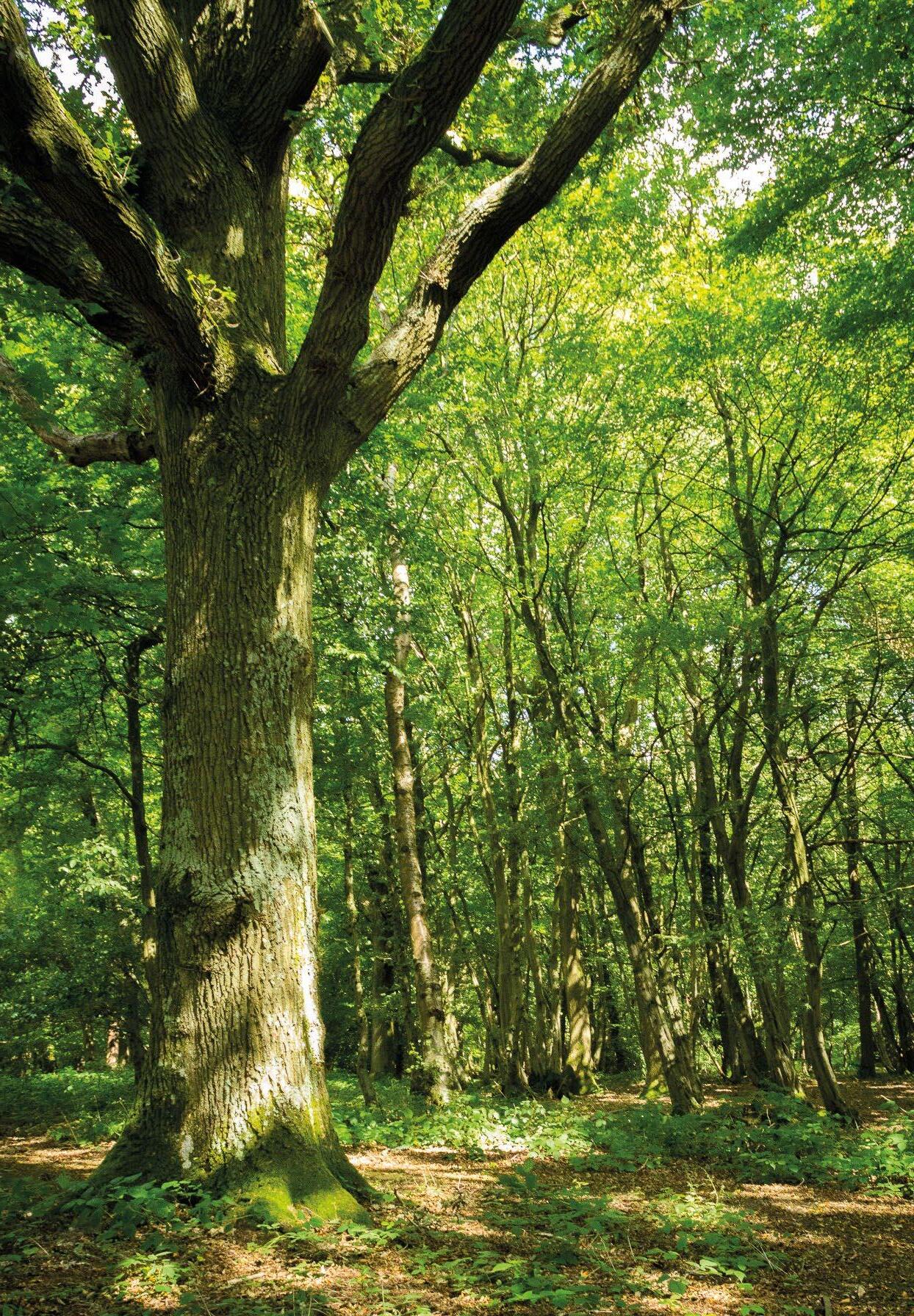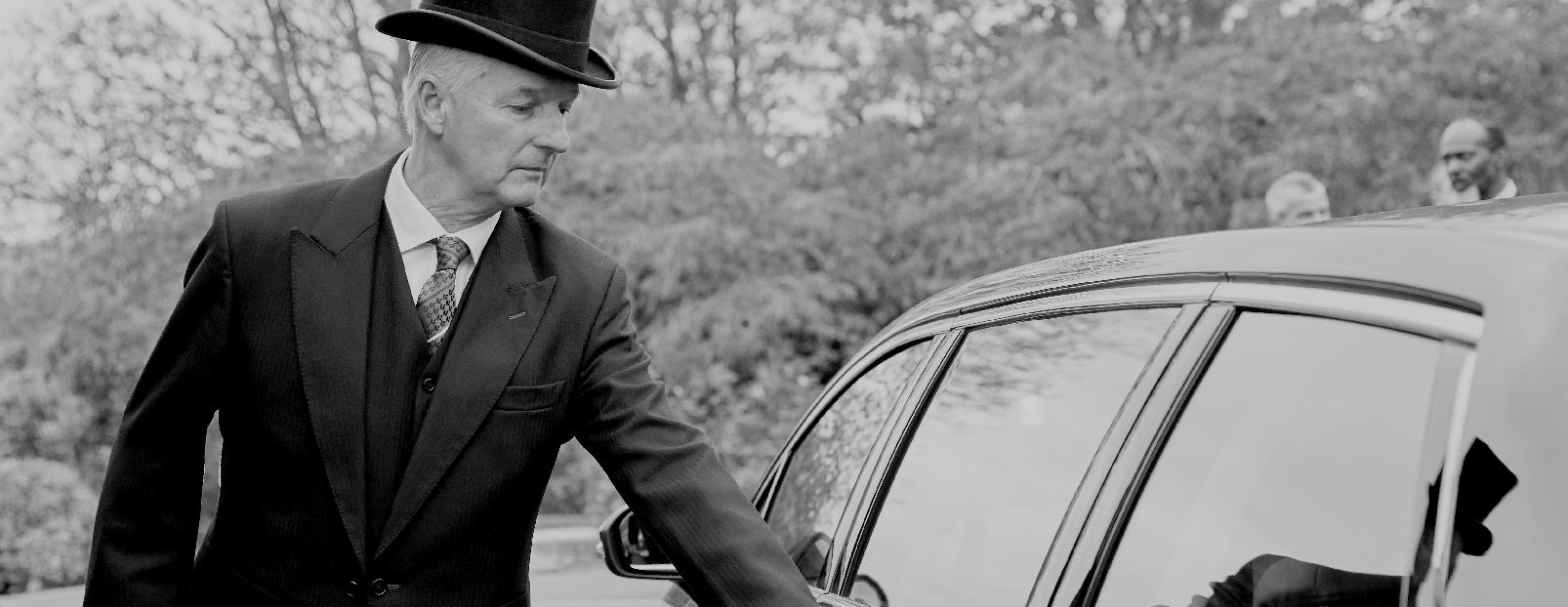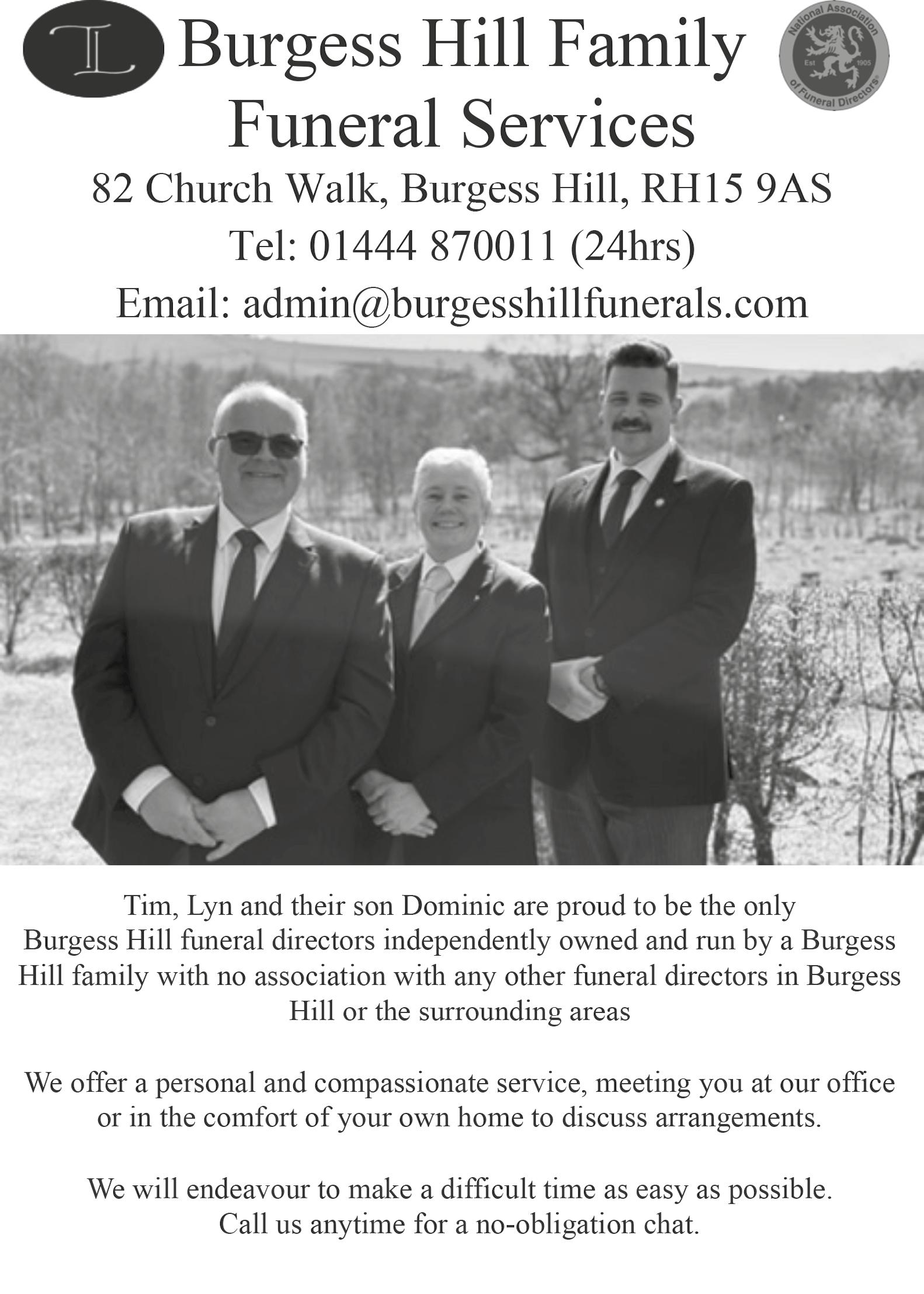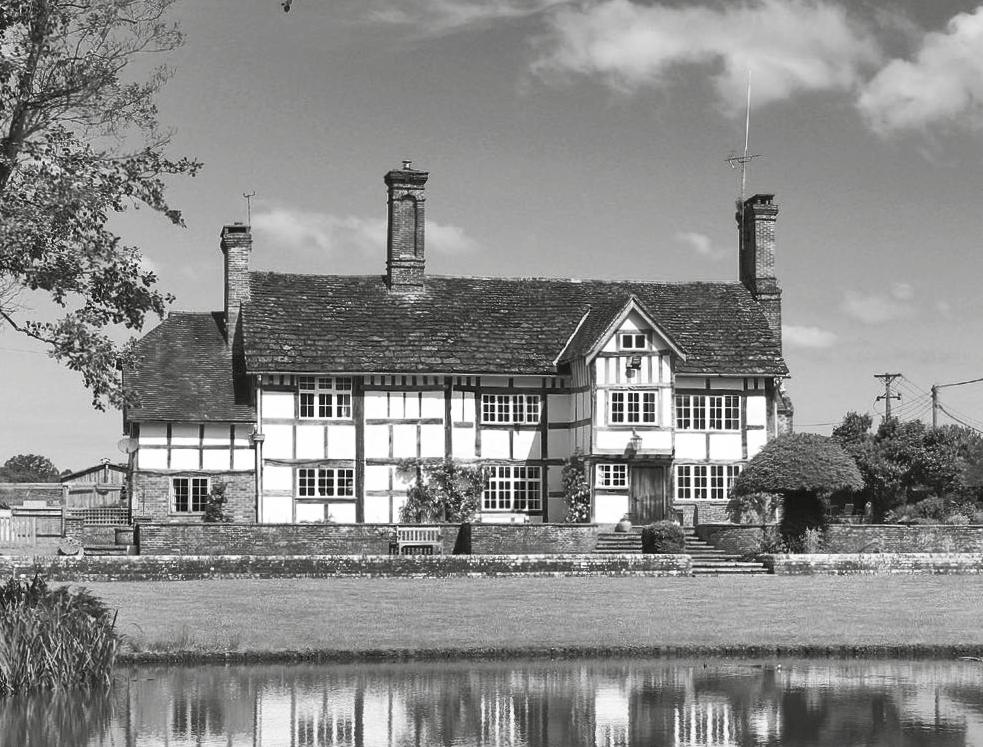

When someone has died
What to do and who can help

A message from St Peter & St James Hospice
This booklet is designed to help you deal with some of the practical and emotional aspects when someone close to you has died. Please accept our sincere condolences.
After a death of someone there are many practical jobs to be done and it may be useful to have the help of a family member or friend. There are a lot of arrangements to be made and it may be challenging to retain information during this time. We hope you find this booklet helpful.
For comments or feedback regarding this publication please contact us:
St Peter & St James Hospice
North Common Road, North Chailey, Lewes, East Sussex BN8 4ED
Registered Charity Number: 1056114
Telephone: 01444 471598
Publication date: April 2025 email: contact@stpjhospice.org
Checklists
Death Certificate
Medical Card
National Insurance Number
Appointment with the Registrar
Who to inform about the death
Government Tell Us Once Service
Tell Us Once is a service that lets you report a death to most government organisations in one go. Before you use the Tell Us Once service, you’ll need a Tell Us Once unique reference number that you will get from the Registrar. A registrar will explain the Tell Us Once service when you register the death. The Tell Us Once Service will inform:
Inland Revenue (HMRC)
Benefits Agency
Passport Office
DVLA
Council Tax Office
Disabled Parking Scheme - Blue Badge
Library
Some public services pension schemes
Who to inform
Accountant
Creditors/Debtors – anyone owed
money by/to the deceased
Banks
Building societies
Credit card companies
Store cards
Car insurance
Household insurance
Life insurance
Church or other place of worship
Digital services – social media, email, online banking etc.
Social Ser vices – if involved
Employer
Family doctor
Relevant hospital doctors/clinics
Dentist
Home help agency
Housing association
Landlord
Internet provider
Telephone company
Mobile company
Clubs & social groups
Mortgage company
Land registry
National Savings and Investments
Premium bond office
Pension providers
School/college – if applicable
Solicitor
Probate office
TV licence
Utility providers: Gas Water Electric
Union
Professional organisations
If you own a grave, notify the local council of any changes
Things to cancel
Home help, meals on wheels, cleaner etc.
Appointments: hospital, dentist, optician etc.
Newspapers/magazine subscriptions
Redirect mail if required
Milk if delivered
Stop Junk Mail, visit www.stopmail. co.uk or ask for a leaflet from the Hospice team
Items to return
Medicines back to pharmacy
Driving licence to DVLA
Library books
Any equipment borrowed from Hospital or Social Services –commode, walking sticks etc.
Passport to passport agency
Season tickets
Concessionary travel documents –bus pass to relevant company
Disabled parking (Blue Badge) to County Council
Car insurance certificate
Car registration documents –for change of ownership
If you need any help or support please call St Peter & St James Hospice on
Registering a death
When someone dies, a doctor will first make a referral to the local Medical Examiner’s Office.
What is the Medical Examiner?
The Medical Examiner is a senior, independent doctor who will complete a proportionate review of a deceased persons notes, ensuring the cause of death is accurate and acts as a single point of contact for the bereaved, to freely ask questions and raise concerns. The service has been implemented by NHS England and the team supporting the hospice are based at East Sussex Healthcare Trust.
When someone dies at the hospice
Hospice doctors will send the ‘Medical Certificate of Cause of Death’ (MCCD) to the Medical Examiner who will complete an overview of the notes.
You will receive a phone call from either the Medical Examiner or one of their officers to inform you what has been listed as the cause of death, inform you of the next practical steps and answer any questions.
Once this is completed, the Medical Examiner’s Office will forward the MCCD to the Register Office for you to register the death.
In some circumstances it is necessary to refer a death to the Coroner’s Office. In this instance, the Coroner’s Office will contact the next of kin to explain the next steps.
You do not need to call the Medical Examiner’s Office, they will make contact with you, however if you do have any questions, they can be reached on:
Tel No: 0300 131 4785 or 0300 131 4892
Email: esht.MEqueries@nhs.net
You may need to attend the Hospice to collect any property and valuables.
When someone dies at home
It is usually the GP who will issue the ‘Medical Certificate of Cause of Death’ and contact the local Medical Examiner’s Office, who will get in touch with next of kin.
When someone dies in hospital
A doctor at the hospital will issue the ‘Medical Certificate of Cause of Death’ and contact the local Medical Examiner’s Office, who will get in touch with next of kin.
How to make a registrar appointment
The Medical Examiner’s Office will forward the MCCD to the Register Office for you to register the death and contact you to inform you of the next steps.
If the death is referred to the coroner, they will issue the paperwork directly to the Register Office. The Coroner’s Office will usually contact you when the paperwork has been completed so you can make an appointment to register the death.
Please do not make an appointment until you have been notified by the Medical Examiner or Coroner that the medical paperwork has been issued. You can then book your appointment online at:
https://www.eastsussex.gov.uk/ registration/deaths/register-a-death/ book-a-death-registration-appointment
Details of the local Register Offices can be found on page 8 of this booklet.
Who can register a death
A relative of the person who died
Someone who was present at the death
Someone organising the funeral
The Registrar will need to know the following:
Date and place of death:
Full name:
Date and place of birth:
Marital or civil partnership status:
Original name prior to any marriage or civil partnerships:
Home address:
Occupation of the person who died:
The date of birth of surviving partner:
You will need to make an appointment at the Registrar’s office as soon as possible to formally register the death. The registration needs to occur within five days of death; this includes weekends and bank holidays.
If it is not convenient for you to register the death in the County Council area where the person was at the time of death, for example if you live some distance away, you may prefer to make a declaration of the death at your local registration office in another district. Staff from your local Registration Office will be able to offer you advice on the procedure for this.
Registering a death
Which documents will I receive when I register a death?
After registering the death, you will receive several documents that you require to arrange the funeral and probate process:
A certificate of registration of death.
A certified copy of the death certificate. The Registrar will ask you if you require copies of the death certificate for official purposes. A certified copy is required by banks and other institutions to confirm the death, so it’s wise to order several when you register the death. Each extra certified copy of a death certificate currently costs £12.50.
A unique reference number for the Tell Us Once service. After registering the death, you will be able to access Tell Us Once, a free Government service. The Registrar will issue you with your unique reference number for this service.
If the deceased died at St Peter & St James Hospice, North Chailey, then the death would be registered in East Sussex (Lewes or Crowborough as specified, although Eastbourne and Hastings are also available).
As both Burgess Hill and Haywards Heath come under West Sussex, you can go there to provide information (known as giving a declaration) but will be unable to obtain certificates from these offices.
The paper work would need to be processed by one of the East Sussex branches before registration could be completed and certificates issued. Death Certificates would need to be ordered through the East Sussex County Council website.
Other things to discuss at the Registrar’s appointment:
The Registrar will automatically notify Adult Social Care for you if they have been involved with the person who died.
Make an appointment at your local Register Office
Burgess Hill Register Office
Burgess Hill Library, 15-19 The Martlets, Burgess Hill, RH15 9NN 01243 642122
Crowborough Register Office
Hookstead, Goldsmith’s Avenue, Crowborough TN6 1RH 0345 608 0198
Haywards Heath Register Office 34 Boltro Road, Haywards Heath RH16 1BN 01243 642122
Lewes Register Office
Southover Grange, Southover Road, Lewes BN7 1TP 0345 608 0198
Solicitors, Wills and legal matters
If a Will was made:
The Will may include funeral wishes, wishes regarding the estate and the name of the executor/s or the person/s legally entitled to deal with the estate. If the Will is held by a solicitor, they should be informed. Named executors can administer the person’s estate on their own (information on how to do this can be found online at www.gov.uk) or they may prefer to obtain the help of a solicitor to carry this out. A Will may be stored with the National Probate Registry in Newcastle (0300 303 0648 or 0300 123 1072).
If no Will is in place:
When someone dies without having made a Will, they are said to have died ‘intestate’ and different rules apply. When this happens, the law sets out who should deal with the person’s affairs and who benefits. This can be a complex situation and can take some time.
Further information can be found online: www.gov.uk/browse/births-deathsmarriages/death www.bereavementadvice.co.uk
Probate
Depending on the estate, probate may be required, and this can take time.
You can apply for probate yourself or ask a solicitor to apply for you. Solicitors’ fees vary, so you may want to obtain a few quotes before deciding on a solicitor.
The costs of dealing with the estate are usually paid from the estate. The Bereavement Advice website www.bereavementadvice.co.uk can help and advise regarding probate (although for specific legal advice this may incur a fee).
Bereavement Support Payment
Help may be available through the Bereavement Support Payment which replaced Bereavement Allowance (previously Widow’s Pension), Bereavement Payment, and Widowed Parent’s Allowance.
You could be eligible if your partner:
Paid National Insurance contributions for at least 25 weeks in one tax year since 6 April 1975
Died because of an accident at work or a disease caused by work
When they died you must have been: Under State Pension age
Living in the UK or a country that pays bereavement benefits
You’ll receive a first payment and then up to 18 monthly payments. There are 2 rates.
If you receive Child Benefit (or if you do not receive it but are entitled to it), you are eligible for the higher rate.
If you do not receive Child Benefit you will be given the lower rate unless you were pregnant when your husband, wife or civil partner died.
You must claim within 3 months of your partner’s death to obtain the full amount. If you claim later, you’ll receive fewer monthly payments. Your payments will be paid into your bank or building society account. You cannot claim Bereavement Support Payment if you’re in prison.
The Bereavement Service helpline is 0800 151 2012 (or Textphone: 0800 731 0464) and is open Monday to Friday from 8am-6pm.
Further information can be obtained from www.gov.uk/bereavementsupport-payment First Monthly payment payment
Higher rate
Lower rate
£3,500 £350
£2,500 £100
Rates correct at date of publication (July 2023)
Tax helpline for the bereaved
The HM Revenue and Customs (HMRC) have created a dedicated telephone helpline, postal address and a specific form for people who need to contact them about PAYE and Self Assessment matters relating to bereavement.
Bereavement Helpline:
0300 200 3300
Textphone:
0300 200 3319
The phone line opening hours are Monday to Friday: 8am to 6pm
If you do not use the Tell Us Once service and need to write to HMRC for help with
tax after someone dies this is the address for correspondence.
HM Revenue & Customs
Pay As You Earn and Self-Assessment
HM Revenue and Customs
BX9 1AS
United Kingdom
Deceased Estate Helpline
You can call HMRC to get specialist advice on a person’s estate, if you need to register for and send a tax return for the administration period.
0300 123 1071
Funeral directors and arranging a funeral
You may already know which funeral director you would like to use. The person who died may have left very clear instructions for their funeral, or taken out insurance to pay or part pay for their funeral.
However, if this is not the case, you will need to decide how best to arrange this. Remember there are now many choices open to you to help you best reflect the
person’s life; for example, different kinds of caskets and urns, traditional services or humanistic celebrations, church burial grounds and natural burial grounds, deciding to keep ashes or choosing a place to scatter them. You might want to give yourself some time to decide what matters most. You don’t have to use a funeral director; you can arrange a funeral independently.
Funeral directors and arranging a funeral
Funeral directors can charge different amounts for the same services; therefore, it is advisable to get more than one quotation to compare prices. A good funeral director will give you a detailed list of charges, with an explanation of each item; this will help you make your final decision. Once you have chosen a funeral director, make sure you: get a written quotation which gives details of all costs you will be charged ask about fees paid by the funeral director to others on your behalf (disbursements) e.g., service at crematorium, faith leader or officiant fee and newspaper announcements
You may need to sign a contract with the funeral director. Please make sure you read it carefully and ask the funeral director about anything you do not understand.
Your funeral director will make all the arrangements for the burial or cremation and will advise you on all the procedures. They will arrange for the notice of death to be announced in the local newspapers if you would like to.
In Memory
Funeral directors’ trade associations
Funeral directors are not regulated or licensed, but most are members of one of two trade associations:
National Association of Funeral Directors (NAFD)
Helpline: 0121 711 1343 www.nafd.org.uk
Society of Allied and Independent Funeral Directors (SAIF)
Helpline: 0345 230 6777 / 01279 726777
Office opening hours: Mon-Fri 9am-5pm saif.org.uk
Members of these trade associations must provide you with a price list on request. They cannot charge you more than their written estimate unless you give them permission. It is not always clear from their advertisements if a funeral director is independent or part of a group, so ask the funeral director before you go ahead. It is most important that the family selects the funeral that suits their wishes and circumstances. The cost of a funeral may influence the choices you make.
After someone close to you dies, it can be comforting to choose a fitting way in which to remember that person. There are a number of ways in which you may do this, from an online tribute page where family and friends can share memories, photographs and dedications, to a physical item of remembrance, such as an engraved heart that can be hung on our remembrance tree at the hospice.
You will find ways to remember someone special on our website. stpjhospice.org/support-us/fundraising/give-in-memory
Funeral expenses payment from the Social Fund entitlement
If you are responsible for arranging a funeral and you have insufficient money to pay, you may be eligible for a funeral expenses payment from the Social Fund of up to £1,000.
This will depend on the benefits you are receiving, your relationship with the person who died and any other monies, other than your personal savings, that may be available to help with the cost of the funeral. The easiest way to apply for a Funeral Expenses Payment is by phone:
Bereavement Service helpline 0800 151 2012
You can also claim by downloading and completing the claim form (SF200), then sending it to the address on the form.
You must apply within 6 months of the funeral, so it is important to contact them as soon as possible. Funeral expenses payments have a maximum threshold and not everyone is given the full amount. It is essential to consider this when organising the funeral.
In some cases where no one is able to pay for the funeral, the local authority may help – but it is important that you contact them before the funeral has been arranged. Your funeral director should be able to advise you.
If you received a funeral expenses payment, it will have to be paid back from the estate of the person who died. The estate means any money, property and other things that the person owned.
A house or personal items that are left to a surviving partner or surviving civil partner will not be counted as part of the estate.
A list of benefits/assistance that may be available to you can be obtained from www.gov.uk/when-someone-dies Bereavement Service helpline is 0800 151 2012 (or Textphone: 0800 731 0464) and is open Monday to Friday from 8am-6pm.
House Clearances
You may find yourself responsible for the home and assets of someone who has died. Clearing a property can be a daunting experience and we are here to help.
Our St Peter & St James House Clearance team will collect all household contents, and will then take the items to be sold in our charity shops where proceeds will help support delivery of our hospice services.
To enquire about a house clearance, visit our website stpjhospice.org/shop/houseclearance

Grief isn’t a state but a process: it keeps on changing – like a winding road with quite a new landscape at each bend
C S Lewis

Bereavement is what happens...
Grief is what we feel...
Mourning is what we do
Words are often inadequate in the face of the death of a partner, relative or friend. The following is offered to help you through this time by highlighting common shared concerns. Not all of it may be relevant to your particular experience or situation but you may recognise and identify with some of what is described.
Grief is very personal
The death of someone close to you can be both shocking and distressing and you may not have the support of those around you. There are many ways in which you may express your grief, sometimes you may cry, or feel irritable, tired or sad. Your thoughts and feelings may seem confused, and you may not quite recognise yourself, or cope very well with everyday demands. You may like to talk to other people about how you are affected by your bereavement, or you may be someone who is very private about their feelings.
During this time of grieving and mourning, you may need the support of others. Speaking to someone about how you feel may help you to feel less isolated. St Peter & St James Hospice recognises this and offers a confidential support service to the bereaved.
Please call 01444 471598 and ask to speak to a counsellor.
Coping with grief
Grief is a feeling and affects us all regardless of background, culture or beliefs. To grieve when someone dies is natural, but no two people grieve in the same way and grief follows no set pattern or timetable. It is common for feelings to include sadness, anger, relief, fear, depression and guilt
The death of a family member or friend can be devastating and may bring about stronger emotions than you have previously experienced or expected, particularly if your partner, relative or friend had been ill for some time.
For some people grieving starts at the time of death and for others it starts at the time of diagnosis of a life-limiting illness. People grieve in different ways. Be kind to yourself.
Your thoughts and feelings are likely to be a natural part of the grieving process. Grief is also a social upheaval and involves a series of changes in lifestyle and in attitudes to living. The world with which you were familiar has changed and you will have to adapt to new circumstances.
Major change results in difficulty with new situations. Certain circumstances can make it more complex. You may be unclear how to cope and find meaning or purpose in your life. What you can do may be restricted by your own health and mobility problems. You may feel isolated especially if you have cared for someone over a long period of time. You may have
to work, perhaps look after children and older relatives, deal with financial concerns or have other responsibilities which can leave you feeling overwhelmed and vulnerable.
Grief is the way we adjust to what has happened and it may take some time before you are ready to ‘live’ again, coping with everyday tasks and feeling part of the world. Try to be patient and take time to grieve.
Mourning
Many cultures have different rituals and customs around death, and we acknowledge this and the individual needs of the bereaved. Many things might help you make sense of what has happened; your cultural or religious beliefs, good friends, neighbours, a book, a piece of music or just time passing.
Mourning the loss of a partner, relative or friend can also make us question our beliefs and indeed the meaning and purpose of life, as often when someone close to us dies it can make us question our own lives.
As time passes mourning usually becomes less painful, and with help most people can begin to find interest in the present and start to see a future, although this may be hard to believe if you are in the first weeks or months of your bereavement.
Thoughts and feelings you may be having
Many thoughts and feelings are quite common in bereavement, including: “I don’t believe they’ve gone”, “I can still hear and see them”, “is this normal or am I going mad?”.
Even if you have known for a while someone is going to die, there is often a sense of shock when death occurs. You may feel cold, numb, empty and unreal for a time, also to have trouble believing he or she is dead and is not coming back.
You may see them in your dreams and wake with a sense of wellbeing being comforted for a moment and then distressed as you realise you were only dreaming. Many people report seeing or hearing the deceased and sense they are there; for others it is difficult to get any sense of the person who has died.
These feelings, while not universal, are normal and they will go after time has passed.
“Why me?”
A question many people ask but there is no answer. You may question your beliefs and feel very angry and let down. Experiencing the death of someone close to you may seem cruel and unfair and you may be unsure who you are without them. It is important to talk about these questions and to recognise that they are part of being human.
“I question what life is about, why has this happened?”
Bereavement can trigger a heightened sense of spiritual awareness even for someone who has rejected or is unclear about their spiritual beliefs. Questions about the meaning and the purpose of life or the afterlife are common. The Counsellors at St Peter & St James Hospice are available to discuss these important questions.
“Who can I talk to?”
It is usually helpful at this time to talk over feelings and memories. Friends and relatives often want to help. However, they may also be grieving and find listening painful and difficult or they may be worried in case they say the wrong thing and upset you.
“How am I going to cope on my own?”
When someone you have depended on dies, you may feel insecure, lonely, helpless, wonder ‘how am I going to cope?’ and may not know how to do some of the things they used to do. You, therefore, may also feel; useless, frustrated and angry. This is a natural reaction; any change is hard particularly at this time. The support of family or friends can be invaluable, of course some people are better listeners than others; find someone you can easily talk to.
Thoughts and feelings you may be having
“Why are some days easier than others?”
Grief comes and goes, and each day or parts of the day can make your mood change from feeling calm to feeling very sad and even despairing. It’s often difficult to know what has caused this fluctuation. It can be helpful in the early stages of a bereavement to take one day at a time. You may have more dark days initially, but as time passes and you have more experience of this new life, you may notice what helps to comfort and support you.
“Is it a good idea to make decisions at the moment?”
It is sometimes tempting to think that life would be more bearable if you kept busy, moved house or quickly disposed of possessions. The urge to avoid painful situations and memories is natural. However, changes that are made too quickly may make things worse. Important decisions, such as where you live need careful thought, and your views may be quite different in a few months’ time.
Remember that you have been fully occupied practically and emotionally with the experience of supporting and caring for your partner, relative or friend and you will now need time to adjust to life without that person.
“Is it normal to feel irritable and angry?”
You may feel irritable and angry some or much of the time following a bereavement. It is not uncommon to direct your anger and irritation at those
people closest to you, or even at the person who has died. You may be irritable and bad tempered without understanding why and you may notice that it is easier to feel angry than to feel sad or vulnerable.
Remember this is only temporary, acknowledging and admitting to these difficult emotions will allow them to change.
“Why haven’t I felt well since they died?”
Physical symptoms are very much part of the impact of grief. Crying, sleeplessness, over-eating or having no appetite and feeling physical pain similar to that of the deceased are all common. These should subside as the shock lessens and as you begin to accept the reality of what has happened.
“Why is everything such an effort?”
Whilst grieving you may feel constantly tired and low. Look after yourself and try to keep to a simple routine. It can be helpful to eat regular meals, take gentle exercise and rest properly even if you cannot sleep. Some people become very busy and find it hard to relax; if this has happened to you, it probably has served as a helpful distraction especially in the early months of your bereavement. However, it may be harmful to your long-term wellbeing. To avoid this, you may want to talk to someone about how to best look after yourself, a counsellor, GP, or someone who is significant in terms of your cultural or religious beliefs may be able to help.
“Why do I feel so guilty?”
You may find that you have regrets for things left unsaid, things done and not done. Many people feel guilty and blame themselves; these feelings are not uncommon, and they occur because death is so final.
Your relationship to the person who has died may not have been easy and you may have mixed feelings about their death. You may even feel relief, especially if you have cared for them during a long illness. It is important to acknowledge what you really feel and express any resentments, irritations and anger. Feelings of guilt can often be unexpressed resentment.
“Am I being disloyal?”
With the passage of time, you will find your memories of the deceased less distressing, and this might make you feel disloyal. Remember the past is always a part of you and need not affect your enjoyment of the present, or for the future.
“People say I should be getting over their death, but I don’t seem to be, is that ok?”
The idea of ‘getting over’ someone’s death can be difficult, uncomfortable and simply unrealistic. It may be more helpful for you and others to see that your future life can continue with a strong bond with the deceased. This connection may be with you for the rest of your life.
You may have important memories you find helpful to re-visit and talk about to others. You might also continue to feel emotionally involved with the deceased and choose to call upon what you remember about them to guide you in your life. As long as you are able to go on and in time ‘live’ your life again then the person who has died can always be with you.
“Why don’t I feel anything six months on?”
The shock of a partner, relative or friend dying can leave people feeling numb. You may find it hard to express your feelings, so you may find it difficult to grieve. Although in the short-term this may help you to ‘live’ on, experience shows the possibility of further losses may trigger in you an unexpected and painful reaction. Depression may also be a risk because your feelings have gone underground.
Talking to a bereavement counsellor over time can help to gradually uncover your feelings and avoid future problems.
Grief in children and young people
The level of understanding of the meaning of death and the individual responses will vary according to the age, personality and maturity of the child.
Children and young people always sense something is wrong from the behaviour of those caring for them and from the changes that inevitably occur because of the death. They frequently show their grief in ways that adults do not expect. They might express themselves physically rather than verbally. Children tend to grieve in spurts and may go through periods of time when they seem unaffected.
Young people can often feel torn and self-conscious because at this stage of their lives they are beginning to separate from family, gaining in confidence and independence. A death in the family can challenge this, making them feel insecure and in need of family. They may feel childlike, not knowing how to cope.
Helping children and young people
Frequently, adults, knowing how painful bereavement can be or having difficulty in accepting the death themselves, attempt to shield children and young people from uncomfortable feelings such as sadness and anger by telling them little or nothing about what has happened.
There is a lot you can do as a parent, grandparent, relative or family friend to support a child or young person at this very difficult time. Here are some suggestions you might find useful.
The more open you can be with children and young people about the emotions and practicalities that arise following a death the more you will be helping them to come to terms and accept what has happened. They will then feel more able to express their own feelings.
Some suggestions to help you and your child or young person
Reassure them they are still loved and will be taken care of, then make time to give them more attention
Maintain as much stability, security and order as possible
Answer their questions honestly and in a way they can understand. Be aware you may have to do this repeatedly
Reassure them that death is not catching. It is common for children to feel they have been responsible for the death in some way, and you should reassure them they could not have caused the death
Children and young people need to feel secure and to know if they want to talk there is someone there who will listen to them and not be embarrassed by hearing about their feelings. They can be involved in funeral arrangements in ways that everyone can cope with, perhaps choosing a song or a piece of music and some flowers to take with them
It can be helpful to explain that a funeral is to allow everyone to say their goodbyes to the person who has died. Allow them to share in making decisions about their role in attending the funeral and visiting the grave. Prepare them in advance for what they will see, explain for example, what will happen at a cremation, at what point the coffin will disappear and perhaps involve them in what happens to the ashes
Encourage children and young people to share their thoughts and feelings, especially younger children. Provide younger children with the means to express painful feelings, anger – to bang a drum or to run or shout if they need to, be quiet and sad – letting them know that crying is ok and natural. Share grief with them. Allow them to comfort you when they want to. Do not hide your tears from them – they need to know that crying is appropriate and acceptable, for boys and girls
With your patient support, the child or young person will be better able to work through the grief process and to adjust to life without the person who died.
St Peter & St James Hospice Counselling Service
Our confidential counselling service is offered to people regardless of, but sensitive to, family circumstances, sexual orientation, religious or cultural beliefs, race or disability. We can visit you in your own home or you may choose to meet a counsellor at the hospice.
If you need to talk to someone other than your family and friends, then please contact the Counselling Team on 01444 471598.
Organisations and their contact details
These organisations may be of some help to you. Details correct at time of printing.
Age UK
Age UK East Sussex
01273 476 704
information@ageukeastsussex.org.uk
Age UK West Sussex, Brighton & Hove
0800 019 1310
9am-5pm Monday to Thursday and 9am-4pm Friday
info@ageukwsbh.org.uk
AtaLoss
www.ataloss.org
Live Grief Chat – free professional support
9am-9pm Monday-Friday
For general enquiries email: office@ataloss.org
AtaLoss helps bereaved people find support and wellbeing. The website has a 6 week, online and in person course using films and small groups to help you work through your grief called The Bereavement Journey. The website also provides everything bereaved people in the UK need in one place, and signposts them easily to support (national, specialist and local services) reliable information, resources and emergency support.
Bereavement Service: Department for Work and Pensions (DWP)
Bereavement Service helpline
0800 151 2012 Monday to Friday 8am-6pm
www.gov.uk is a Government website that contains a wide range of services and practical information on what to do after death in England and Wales, including any benefits, your eligibility and how to claim. www.gov.uk/when-someone-dies
Bereavement Advice
www.bereavementadvice.co.uk
0808 168 9607
Helpline and web-based information service with practical information and advice on the many issues and procedures that face us after the death of someone close.
Child Bereavement UK
www.childbereavementuk.org
0800 028 8840
helpline@childbereavementuk.org
Child Bereavement UK helps families to rebuild their lives when a child grieves or when a child dies. They support children and young people (up to the age of 25) when someone important to them has died or is not expected to live, and parents and the wider family when a baby or child of any age dies or is dying.
Childhood Bereavement Network
childhoodbereavementnetwork.org.uk
The Childhood Bereavement Network (CBN) is a specialist membership organisation, working together to support bereaved children and young people. They don’t offer direct support, but their network of members does.
Cruse Bereavement Care
www.cruse.org.uk
Support helpline: 0808 808 1677
Central Office: PO Box 800, Richmond, Surrey TW9 1RG
Counselling, information and practical support. Helpline, online grief counsellors and local support services for anyone who has been bereaved.
Hopeagain
www.hopeagain.org.uk
National Helpline 0808 808 1677
Monday-Friday, 9.30am-5pm helpline@cruse.org.uk
Hopeagain is Cruse Bereavement Care’s Youth Involvement Project which aims to support young people after the death of someone close to them.
Citizens’ Advice Bureau
www.citizensadvice.org.uk
Burgess Hill
Burgess Hill Library, 15-19 The Martlets, Burgess Hill, West Sussex RH15 9NN www.advicewestsussex.org.uk
0808 278 7969
Mon-Fri 9am-4.30pm
Haywards Heath Oaklands, Paddockhall Road, Haywards Heath, West Sussex RH16 1HG www.advicewestsussex.org.uk
0808 278 7969
Adviceline: Mon-Fri 9am-5pm
Newhaven & Lewes 15-19 Chapel Street, Newhaven East Sussex BN9 9PN www.lewesdistrictcab.org.uk info@lewesca.onmicrosoft.com 0808 278 7892
Mon-Fri 10am-3.30pm
Wealden (Uckfield) Citizens Advice
Uckfield Library, Library Way, High Street, Uckfield, East Sussex TN22 1AR
www.wealdencitizensadvice.org.uk
0808 278 7811
Mon 10am-12pm, Tue/Thu/Fri 10am-2pm
Organisations and their contact details
Digital Legacy Association
www.digitallegacyassociation.org
Our digital footprint is the trail that we leave when we use the Internet. Our digital footprint may include social media messages, blog posts, and media such as photos and videos.
Large parts of our digital footprint will inform and convert into a digital legacy when someone dies. Our social network profiles (like Facebook and Twitter) may also become virtual places of remembrance where messages of respect and condolences are left.
The Digital Legacy Association is the only professional body dedicated to digital assets and digital legacy. They provide free resources for the public to help make arrangements for their digital legacy. They provide guidance for how to deal with online assets such as social media accounts when someone dies.
Dying Matters
www.hospiceuk.org/our-campaigns/ dying-matters
Dying Matters has a range of resources including a podcast to open up conversations around death, dying and grief and remove the stigma that surrounds it. Website links to a range of available resources in various formats.
Grief Encounter Project
www.griefencounter.org.uk
0808 802 0111
Weekdays 9am-9pm
Support and information for bereaved children and young families.
Jewish Bereavement Counselling Service
www.jbcs.org.uk
Helpline:
020 8951 3881 enquiries@jbcs.org.uk
A dedicated Jewish bereavement counselling service for adults and children individually, families, couples and groups. Supporting people affected by loss, including suicide, disaster, holocaust issues, sudden infant death, miscarriages, stillbirth and abortion.
Macmillan Cancer Support
www.macmillan.org.uk
Support Line: 0808 808 0000
Monday to Friday 8am-8pm
If someone close to you dies from cancer, Macmillan can help you cope with grief, get you all the practical information you need and, when you’re ready, offer ways to celebrate the life of your partner, relative or friend.
Muslim Youth Helpline (MYH)
www.myh.org.uk
Freephone from all UK landlines
0808 808 2008
4pm-10pm
info@myh.org.uk
Web chat function is available via their website or if you prefer texting, they can chat with you through WhatsApp 0808 808 2008
National Debtline
www.nationaldebtline.org
0808 808 4000
Monday to Friday 9am-9.30 pm and Saturday 9.30am-1pm
A free, confidential, debt advice service for people in England, Wales and Scotland, run by the charity the Money Advice Trust. Telephone/Webchat advice and online guides, fact sheets, budget tools and sample letters.
Partnership for Children
www.partnershipforchildren.org.uk
07506 110940
info@partnershipforchildren.org.uk
Good mental health for children, helping your child cope with bereavement. Programmes and resources to help young children around the world to communicate effectively, to cope with their anxieties and difficulties, and to develop skills for life.
Samaritans
www.samaritans.org
National telephone: 116 123 (this number is free to call)
jo@samaritans.org (UK and ROI)
A confidential support service available to anyone in a crisis.
Brighton 0330 094 5717
www.samaritans.org/branches/ brighton
Dubarry House, Newtown Road, Hove, East Sussex BN3 6AE
Eastbourne 0330 094 5717
www.samaritans.org/branches/ eastbourne
The Haven, 13 Bolton Road, Eastbourne, East Sussex BN21 3JT
Horsham and Crawley
www.samaritans.org/branches/ horsham-and-crawley
21 Denne Road, Horsham, West Sussex RH12 1JE
Stop Mail
www.stopmail.co.uk 0808 168 9607
By registering with this free service, the names and addresses of the deceased are removed from mailing lists, stopping most advertising mail within as little as six weeks.
Organisations and their contact details
The Silverline
www.thesilverline.org.uk
Call free on:
0800 470 8090
info@thesilverline.org.uk
The only free confidential helpline providing information, friendship and advice to older people, open 24 hours a day, every day of the year.
The Compassionate Friends (TCF) www.tcf.org.uk
National Helpline:
0345 123 2304
7 days a week 10am-4pm and 7pm-10pm
The line is always answered by a bereaved parent helpline@tcf.org.uk
National Office: 0345 120 3785
TCF is a charitable organisation of bereaved parents, siblings and grandparents dedicated to the support and care of those who have suffered the death of a child/children.
WAY Widowed and Young
www.widowedandyoung.org.uk
0300 201 0051
Monday-Friday-9.30am-5.00pm contact form on website
WAY supports young, widowed men and women (aged 50 and under) as they adjust to life after the death of their partner – whether it was; a month, a year, or ten years ago.
Winston’s Wish www.winstonswish.org
National Freephone Helpline: 08088 020 021 8am-8pm, Monday to Friday ask@winstonswish.org
Charity offering practical support and guidance to bereaved children, their families and professionals including online grief support groups.
Register Offices
Burgess Hill Register Office
Burgess Hill Library, 15-19 The Martlets, Burgess Hill, RH15 9NN 01243 642122
Crowborough Register Office
Hookstead, Goldsmith’s Avenue, Crowborough TN6 1RH 0345 608 0198
Core opening hours are 9am-5pm
Monday to Friday, the office is closed for lunch between 12.30pm-1.30pm
Haywards Heath Register Office
34 Boltro Road, Haywards Heath RH16 1BN 01243 642122
Lewes Register Office
Southover Grange, Southover Road, Lewes BN7 1TP 0345 608 0198
Core opening hours are 9am-5pm
Monday to Friday, the office is closed for lunch between 12.30pm-1.30pm


The Hospice would like to thank RNS Publications for publishing this information and the following pages contain some features from services o ering their help at this time.
Whilst the Hospice is grateful of their support it does not endorse or recommend any of the services that they provide.
STOPPING JUNK MAIL
It is distressing to deal with a bereavement and unsolicited mail can be insensitive and destructive during a grieving process.
By scanning the below QR code on your phone or visiting www.stopmail.co.uk, we are able to securely share this information with mailing organisations and under the Data Protection Act the information will not be used for any other purpose.
Other benefits reduce the possibility of identity fraud, such as assumed identity and you will only have to supply the information once.

C & T Radmall Funeral Service

•
•
•
•
•
•





This publication has been jointly developed between ourselves and the hospice. We hope that it has been or will be of help at this time and we welcome any comments or suggestions that you may have.
Please contact us either by phone, email or by post.


















